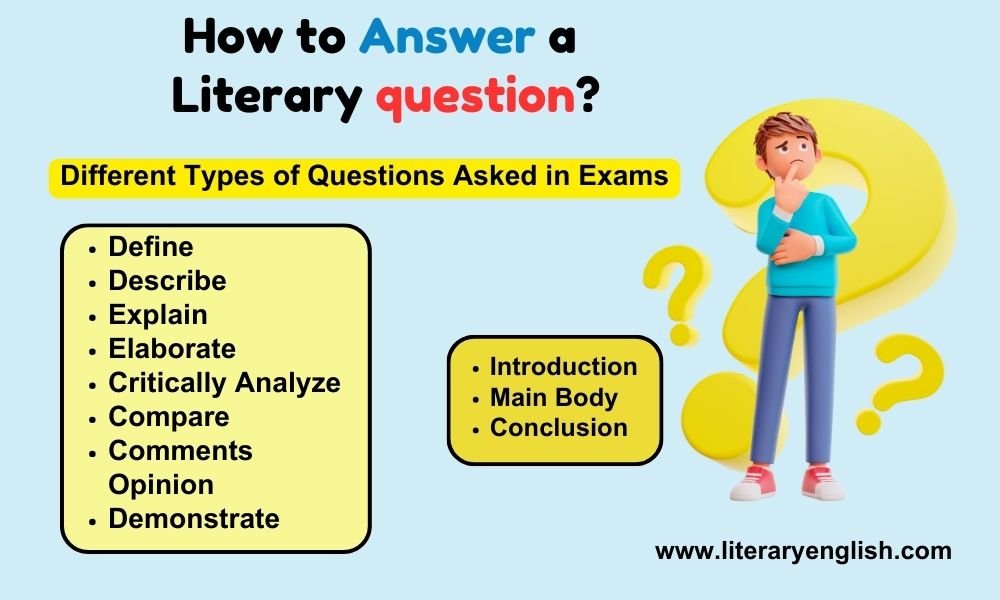Are you worried about answering a literary question? Here are a few tips in this article that can build confidence in students to write a well-structured answer.
How to Answer a Literary Question
The theme is the key part of the question. When students are writing an answer, they first have to ponder the main theme of the literary question. This is very important. Usually, students do not read the whole statement of the question and start writing whatever comes to their mind. This is often due to a lack of time. Students have so many questions to attempt that they cannot afford to spend too much time on any single one. At this point, students need to outline the complete structure of the question. They must make an outline before writing down the answer directly. Students may have many ideas about the asked question, but it is necessary for them to figure out the most important content they are supposed to write. Always divide your answer into three main parts:
- Introduction
- Main Body
- Conclusion
The introduction and conclusion in any question are of vital importance. If students do not introduce the question at the opening of their answer or do not conclude it at the closing, it will create a bad impression on the examiner. They must follow the alpha and omega of the asked question.
We know that all words have different meanings and are used in various contexts in questions. Let us discuss some common question types that might be asked in an exam and what their meanings could be.
Different Types of Questions Asked in Exams
-
Define
This is a very common term. The word “define” means students are to provide a definition of the asked term, e.g., Renaissance in the mentioned question below. When students are writing a definition, they need to state a proper and precise definition. It should be authentic and clear in wording. This question can be asked in three ways. The examiner can ask for a definition generally or in the student’s own words, so the student is free to put forward their ideas and choose their wording freely. They may put other authors’ definitions for reference to strengthen their point of view. When an examiner asks for a specific definition by any author, students are bound to define it according to the author’s ideas. Students may use their own wording, but they cannot put their own ideas into the definition.
Define Renaissance in a few lines.
Define Renaissance in your own words.
How does John define Renaissance in his book, “The Medieval Literature”?
-
Describe
Sometimes an examiner asks students to describe something. This means students have to give complete information about something, e.g., how it looks or how it happened. Students have to provide a complete description in a descriptive format. This question may be asked in this way:
Describe the theme of the above picture according to the plot.
-
Explain
The term ‘explain’ means students have to clarify the topic in detail, including how and why. Students have to write the complete details of the term or concept asked in the question. Things should be mentioned in proper layout, and chronological order is the suitable format. This question needs thorough details, and students should be careful to maintain the proper order. They must start with an introduction, followed by the main body, and finally conclude their answer properly.
-
Elaborate
Another way of asking a question is to elaborate on something or an idea. It means students have to expand on a statement to make it clearer. They have to explore all areas of it. They have to draw a complete picture and elaborate on every segment of that picture. For example, if students are talking about the Renaissance Period in England, they are to elaborate on every aspect involved in the Renaissance. Students should start from the very beginning of the Renaissance in Italy, then its flourishing in England by university wits, and how it gained significance in that era.
- Critically Analyze
Such questions are frequently asked in literature to critically analyze an idea, situation, or thing. Sometimes students get confused and start criticizing something asked in the question, but it never means to criticize anything negatively. It generally means they have to discuss the positive and negative aspects of that thing according to their own thoughts. For good critical analysis, they should include references from authentic writers to strengthen their point of view. One thing to keep in mind is not to criticize any author for their negative comments but to consider it as a valid perspective. If one author is praising poetry and another is against it, students should refer to both but not criticize either individually. Instead, they should analyze by comparing both perspectives.
-
Compare
“Compare” means students are to compare one thing with another. They are to focus on the similarities and dissimilarities between two things. For example, they may be asked to compare fiction and drama.
- Comment or Opinion
This question typically asks students to share their own point of view regarding anything asked in the question. It means that what is the opinion of the student regarding the asked question. What are the views of the candidate? Students, in answer, can use the word ‘I’ or ‘according to me’ while giving their opinion.
-
Demonstrate
“Demonstrate” is a practical term that shows how with an example to illustrate. Students are to give a complete demonstration of anything explained by examples.
